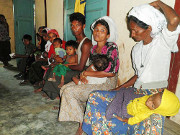
Burma (MNN) — Have you heard what’s happening in Burma’s western Rakhine [Arakan] state?
“This is a humanitarian crisis,” says Oddney Gumaer with Partners Relief and Development. “People are dying every day because they don’t have enough food and they don’t have clean drinking water.”
She visited the area recently, and states, “The things I saw are very disturbing.”
Gumaer made her first trip to refugee camps in Rakhine in October 2012.
“I’ve never seen the kind of poverty that I saw in the camps with the Internally Displaced People,” says Gumaer. “People are literally starving to death and there is a huge lack of medical care.”
After going virtually unnoticed by the international community for several months, some groups are starting to take notice. Gumaer thinks it’s a result of Burma’s government saving face.
“The government probably doesn’t want the world to see that everything is not well in Burma; there’s been so much focus on the good reforms that have happened,” she states.
“To bring any kind of attention to this just proves that there’s a long way to go in Burma before it’s a democracy, and before it’s a fair society for all the people.”
Partners alerted MNN to the desperate situation in November, when the number of Internally Displaced Persons (IDPs) was estimated at 95,000. A Partners worker said the Rohingya people were suffering “Ethiopia-like starvation” while updating MNN in December.
Now, between 120,000 and 200,000 Rohingya Muslims are suffering in refugee camps without food, water, or medical care.
Sectarian conflict between Rakhine Buddhists and Rohingya Muslims living in western Burma has waged for decades. The current situation arose after three Rohingya men were accused of raping and killing a Rakhine woman in May 2012.
“This violence, although it seemed like it started from one particular incident, was just a result of many, many years of oppression, hatred and racism,” explains Gumaer.
She adds that the Rohingya are denied basic human rights, including citizenship in both Burma and neighboring Bangladesh.
“They’re not able to get educated, they’re not able to go to hospitals… they’re not allowed to travel, even in their own state,” she explains. “For many generations, these people have been oppressed and discriminated against.”
Even Burma’s government picks on the harassed Rohingya. They’re actively keeping large aid groups at bay, but Partners found a way in.
“We just started building relationships with the local population. And in that way, we’ve been able to get in and deliver aid,” Gumaer states.
What teams see when they arrive is unimaginable.
“They watched babies die every day, and it was all deaths that could’ve been prevented if the baby and the mother just had some food,” says Gumaer.
Spiritual needs run deep, too. Gumaer explains that to be a Rohingya is to be Muslim. But sometimes, she can offer another source of hope for dark times the Rohingya face.
“What is it like when you’ve lost all your family members, when you’ve seen your children and your grandchildren die and you’re the only survivor?” Gumaer says, describing the questions Rohingya face daily. “What is the point of continuing to live after a disaster like that? There is a need for these people to know that they’re loved, that somebody cares about them.
“There is a need for them to understand the power of forgiveness, because how else are they supposed to continue their lives?”
Ask God to save the Rohingya people from physical and spiritual despair. Pray the government will allow aid to reach the Rohingya soon.
Gumaer says that as she builds relationships with the Rohingya people, she can share more about the Gospel and salvation through Jesus Christ. For now, it’s a matter of showing God’s love through action.
“To be there and to be Jesus for them, to show them His love through my actions and through my words and through my life: that’s the best thing I can do for them at the moment,” says Gumaer.
Click here for a hands-on way to help the Rohingya people through Partners.
